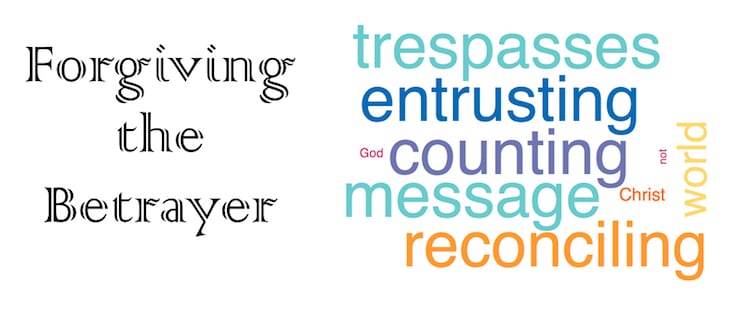So much can be said about Resurrection Sunday, the traditional day marking that day God resurrected Jesus from the dead. It’s the most astounding day in history. The day that God confirmed that everything Jesus said was true. Hundreds of people saw the risen savior and today, we continue with his testimony that he is risen.
Today, I want to end our week on reflecting about this most paranormal of all weeks: Forgiving the Betrayer.
A Note on Love and Love
Before I set up the story, let’s take a moment to describe two Greek words usually translated into English as Love: agapao and phileo. Agapeo is the kind of love God has towards his Son, and which the Son had towards the Father. It’s also the kind of love God has for us. It is unselfish love, ready to serve others. It’s undying love that demands action. Agapeo finds its perfect expression in Jesus Christ. We are commanded to agapeo God.
Phileo is best understood as “tender affection.” We are not commanded to phileo God.
We are not called to love (phileo) life (John 12:25), but we are called to love (agapeo) life (1 Pet. 3:10).
Finding Your Destiny
A few weeks before the Cross, Peter correctly identified Jesus, and Jesus called out Peter’s destiny. Let’s start with an example.
In Star Wars: The Empire Strikes Back, when Luke discovers the identity of his father, his father calls out Luke’s destiny. Luke initially turns away from his destiny but ultimately fulfilled his destiny in Star Wars: The Return of the Jedi. (Vader asked Luke to join him to destroy the Emperor; subsequently Luke asks Vader to join him to destroy the Emperor and Vader does so).
Similarly, one day, Jesus asked his disciples who he was. Peter declared, “Thou art the Christ, the Son of the Living God!”
Jesus agreed, and noted that the Father had revealed this to Peter. Then Jesus revealed to Peter his destiny:
“Blessed are you, Simon Bar- Jonah! For flesh and blood has not revealed this to you, but my Father who is in heaven. And I tell you, you are Peter, and on this rock I will build my church, and the gates of hell shall not prevail against it. I will give you the keys of the kingdom of heaven, and whatever you bind on earth shall be bound in heaven, and whatever you loose on earth shall be loosed in heaven.”
Jesus imparted to Peter the ministry of the Church. Peter was Jesus’ closest friend. His BFF.
And then a few weeks at the Last Supper, Peter told Jesus, “I will lay down my life for you.”[ref]John 13:37[/ref]
Hours later, Peter betrayed Jesus not just one time like Judas did, but three times.
Peter’s guilt crushed him. Surely, his betrayal means he forfeited the destiny Jesus gave him. Surely his actions undid Jesus’ calling on his life. Right?
Forgiving the Betrayer

On the Cross, Jesus asked the Father to forgive everyone who crucified him. That’s everyone, actually. Through the Cross, God forgave everyone. He reconciled the world to himself. Every sin, past, present and future, are forgiven.
But not everyone has received this forgiveness.
Although Peter believed in the risen savior, Peter had not received Jesus’ forgiveness and was living in guilt. He could not get past his betrayal of his best friend, Lord and Savior.
Jesus knew that and wanted to take his guilt away. He wanted to restore Peter’s calling and destiny.
Sometime after the Resurrection, read what happened, from John 21:15-19. And notice how I inserted the Greek words translated as love, to help us understand what is going on in this passage. Recall that Peter publicly denied Jesus three times.
When they had finished breakfast, Jesus said to Simon Peter, “Simon, son of John, do you love (agapeo) me more than these?”
He said to him, “Yes, Lord; you know that I love (phileo) you.”
He said to him, “Feed my lambs.” He said to him a second time, “Simon, son of John, do you love (agapeo) me?”
He said to him, “Yes, Lord; you know that I love (phileo) you.”
He said to him, “Tend my sheep.” He said to him the third time, “Simon, son of John, do you love (phileo) me?”
Peter was grieved because he said to him the third time, “Do you love (phileo) me?” and he said to him, “Lord, you know everything; you know that I love (phileo) you.”
Jesus begins by asking Peter, who is consumed with guilt, if he loves Jesus like God loves Peter. Peter dodges the implication, because God’s love would never lead to betrayal. He replies he has an emotional brotherly affection towards Jesus. Jesus answers by calling Peter into his destiny.
Jesus asks a second time, and Peter again dodges the issue. Jesus answers by again calling Peter to his destiny.
Then Jesus asks if Peter has an emotional brotherly affection towards Jesus. The implication is, this: If I have correct emotions, I will love, but if I have incorrect emotions, I will betray. Peter’s remembers his promise to die for Jesus and his utter failure, and is grieved.
Then look what Jesus does:
Jesus said to him, “Feed my sheep. Truly, truly, I say to you, when you were young, you used to dress yourself and walk wherever you wanted, but when you are old, you will stretch out your hands, and another will dress you and carry you where you do not want to go.” (This he said to show by what kind of death he was to glorify God.) And after saying this he said to him, “Follow me.”
Jesus restores Peter’s destiny. He prophesies that not only will Peter carry on with the destiny Jesus called him to, but that he would fulfill Peter’s own promise to die for Jesus in his old age.
Jesus concludes with calling Peter to forget the past and to “follow me.”
A couple of weeks later, Peter the Betrayer now Forgiven stands up in front of several thousands and preaches the Gospel of Jesus Christ to God’s sheep. A few decades later of continually preaching and spreading the Gospel, Peter is killed for the Gospel of Jesus.
Jesus relates to us based on his actions, not ours. And when we receive this, Jesus gives us our true destiny.
Honor and Love
We honor others based on who Jesus made us and them to be, not on their actions or even our past actions. We love others not based on what they can do for us, but based on what Jesus did for us.
For this reason, we should stop relating to people the old way, and relate to them as God relates to them, and then we need to tell people, “God is no longer mad at you. Come to Jesus and he’ll give you your true destiny!”
And this is ultimately the supernatural message of the Cross.
https://youtu.be/NQCyroCWJE8


Leave a Reply